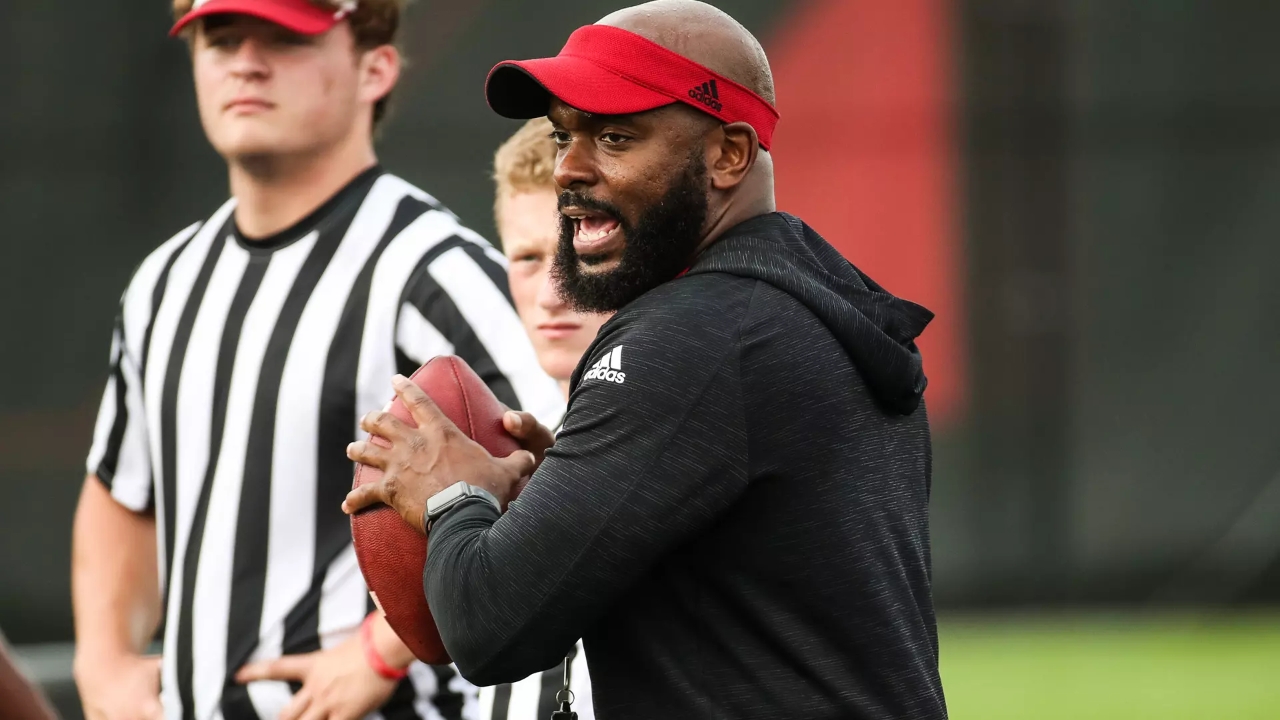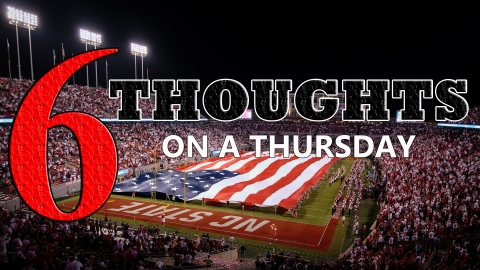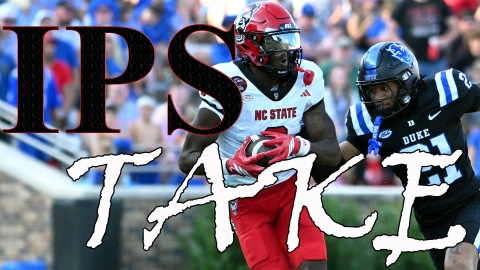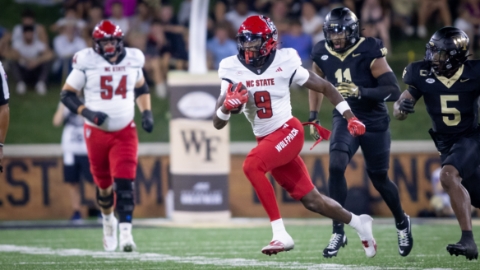
NC State co-defensive coordinator and safeties coach Charlton Warren met with the media to discuss his move to Raleigh, his position group, incoming transfer Jeremiah Johnson, and much more.
NOTE: Click the video above to watch the interview with coach Warren.
All right, Coach, we'll start off with, I'll call out where these guys are from too, so you'll know, learn the names. Charlton, first of all, congratulations on getting the position. And I wanted to ask you as well, I mean, obviously, you look at the move going from UNC over to NC State. I mean, how has that transition gone for you so far?
I tell you what, in all my years of coaching, from a family standpoint, it's been great because I don't have to move, jump on the highway and head this way going to Raleigh. Very familiar with the Raleigh area after living in the Triangle a total of five years. Friends were on the staff here at North Carolina State. So that has been great. From a standpoint of effectiveness for the program, I recruited the Raleigh and Durham areas for the last three years. I'm very familiar with all the recruits in the area. A lot of the local high school coaches have relationships with them. So from that standpoint, it is very, it's great. There's a lot of synergy and being able to stay in an area and still maximize on the things that you are doing well and then help improve on things that you need to work on.
And DJ talks a little bit about your military background and how that helps you as a head coach. I mean, what kind of impact has that had on you being a coach and leading young men as well?
I tell you, going to the Air Force Academy for four and spending 10 years on active duty, some of that in Special Forces, it's really shaped me as a human being. There's nothing out of my life right now that I can't credit to going to the Air Force Academy, going through boot camp, playing football at the Academy, going on active duty for 10 years. And that's really made me the husband, the father, the coach, the mentor of young men that I am today. So that experience has put in a sense of discipline, accountability, the ability to be able to communicate effectively. And one thing that I've always said it does for my career is perspective, right? I've been in some stuff and I've been in the thick of some things over my life. And I understand how bad we want to win football games and championships, but also understand how great it is to take care of young men and make sure they're mentored and coached the right way because you're going to lose some and I hope we win a bunch more than we lose. But in either one of those, those young men have to be guided the right way. We as grown men have to be guided the right way. So I think that military background, that perspective on life has really given me all the tools I think I need to help succeed and help those young men in my room understand the bigger picture in life and also make them competitive and fight and tough and not back down from anybody.
You had to burn all your Carolina gear? That's a joke. That's not my actual question. But I asked DJ this, but for you coming in, what are you hoping to do, to really build trust and buy in with the players who decided to stay and decided to take a leap of faith with you in this position?
I tell you, that's great, because one of my one of the joys of coaching for me is to walk into a room with a bunch of set of eyeballs looking at you and they don't know you from Adam and everything you say to them knowing that they do not believe you because you have not built trust with them. And again, going back to my military background, when you get ready to command and lead your troops and young men, you have to get buy-in as a number one thing because kids can smell it from a mile away if you're full of crap. So for me, I told them today in my meeting, I don't want you to trust me today. I want to earn your trust through meetings, through seeing my knowledge of the game, being able to talk to some of the pro players and guys I've developed in 20 years, and then going to practice and seeing the benefits of what I want to teach you in the concept of the defense to make you a better football player. But more importantly, trust me, I want to earn their trust by pouring into them away from football. We don't play a football game for a really long time around here. And so the great part about that, I'm going to pour into them as humans more than I am as a football player, because I have more time right now to do that. And to me, that's how you build trust. They will know really soon how much I care about them as young men, how much I want to mentor them. And because of that, they're going to play hard. And because of that, I will earn their trust. And one day they'll be on their practice field, something will happen. They're like, yep, that old ball-headed guy was right. That works. And that's what I want to happen. And that's a great moment for those kids when it does.
Jeremiah Johnson, you guys added in out of the transfer portal at the safety position, maybe nickel. I don't know how you plan on using him. But what did you like about him on tape and just your meetings you've had with him so far?
One of the great things I like about players is versatility. A guy that can play safety, can play nickel, can play dime, can play either safety spot. And what that allows us is to get our best 11 football players on the field. I never want to pigeonhole players that you only do this one thing because that makes them a better player, grows their football IQ if they can do it at different levels of the defense and different positions of the defense. JJ is a very versatile, explosive player who has a tremendous football IQ. And that's something that's really underrated. A lot of guys can jump. A lot of guys are talented. A lot of guys can run. Can they process information? Offenses just don't line up and just let you see it run right at you and hope you can stop it. They trick you. They motion you. They formation you. They tempo you. And he's a guy that has shown this in his career. He can process information, get other people lined up, command the defense at different positions, and execute at a high rate. So that's one of the things I think about him. He's a great kid coming from Mississippi. He's a hardworking dude. He's tough. And I think he's a really, really smart football player. I'm really glad to have him.
When you are recruiting talent at your position, what are some of the traits you're looking for?
I think everybody at this level you recruit has the tangible things of they're fast and they're big and they play good. I like intangible things like how much of a competitor is he? When they're up 20 or when they're down 20, I want to turn that tape on and see if he's competing his tail off. Because in this game, when everything else is equal, you better be an alpha dog competitor. And to play this position on the back end where the world sees you if you make a mistake and you can cover up everybody else's, you have to have some thick, tough skin. You got to be a competitive dude. And when something bad happens, you better have a quick memory. And so to me, I want to find out, is he competitive? Does he run the 100 meter? Where's that one-on-one you on you sport? Does he play basketball? Does he play lockdown defense? I want to see the competitive nature of a guy come across the screen at me. I want the film to say to me, this is one competitive dude. And I think when you mix all the tangible things that they got to have, size, speed, those are given to play at this level in the ACC to go win a championship. But I think that competitive nature is what I want to see in a player.
You were hired with the co-defensive coordinator title. What does that relationship look like between you and D.J. Elliott kind of working together to lead the defense?
I tell you, it's one of those things where you get to build something together, to be on the same page. And we both get to bring our experiences, along with everybody else in that room, to make the best package to give the kids the best chance to win. I think D.J. and I have been in similar families of defense, where he can look at me and I can look at him and say, oh, we're going to play that way. Done. And so there is some familiarity when you've been in the same trees of defense. And then when it comes time to really hash out things that are different, we're both coming with an understanding of both sides. So I think to come as a co-coordinator just signifies from an experience level. I've called defenses before. I've been in charge of defenses before. I've been a part of some really great defenses. It's just the expectation to bring some of my knowledge to the table and then blend it with whatever Coach Elliot wants to do at the end of the day. So I think it's just an experience thing.
And then just to follow up, outside of not having to move too far, why was this an opening that you were ready to pounce on and be able to work for Coach Doeren at NCState?
Oh, yeah. I mean, the family side is one thing, but obviously from a career standpoint, I'm always looking to grow and I'm still learning. And I think when you have a program that's built on toughness, when you have a fan base, that when you walk into the stadium, you know you're going to have to deal with them on the opposing sideline. And the players just grind and work for 12 months to win football games. Any football coach in their right mind would want to run this way, right? And so for me, it wasn't just about location, okay? That was easy. For me, it was the part that the culture, the climate, the fan base, those things really excite me as a football coach and a lover of college athletics. So it was an easy decision from that standpoint. And to get along, to work with some of these coaches on the staff that I've known over the years, to come with DJ, it was just a tremendous opportunity from a professional standpoint and as a lover of the game of college football, this is a great place.
Hey, Charles, not to hammer home this point, right? But, I know it's a job, but, you know, you are going from UNC to NC State. I know coaches do this kind of thing all the time, right? Now, I know even you yourself, I think of, we're at Kentucky, Florida, and Georgia, those rivalry dynamics. Have you gotten any kind of fun interactions, messages, you know, friends, family, former players, coaches that work with, reach out to you and kind of, you know, give you grief for a, you know, switching sides on a rivalry like this, if you will?
Not really. I think most of the people in my circle, they're happy that I have a chance to grow as a coach and pour into the kids. I think whenever you change jobs, whatever those circumstances are, I'm always looking at it as a chance to grow and be better than I was at wherever I came from. And that's a challenge I put on myself. But I think people naturally, and especially in this area, your neighbors, you know, people in the neighborhood, like, oh, you're doing this. And I get it. But for me, I don't really look at it that way. I really look at it as I got a chance to pour into a new room of people that need my guidance. And I got a chance to do whatever I can to help this program reach its goals that it's had. And I think sometimes the rivalries, of course, those are associated with it. But again, my perspective is different from a lot of people. I'm really focused on the task at hand, which is those players for now, and then wins and losses and winning games and all that stuff later on. So yes, but I've sort of blocked it out.
And I'm pretty laser focused.
You've been able to be a part of a ton of winning organizations dating back to your playing days, you won 22 games, I believe your last two years, you know, from Fisher to Berry to Kirby Smart, you know, all the coaches in between. What are some of the things you've kind of picked up along the way that makes for championship organizations?
Great question. I tell you, one to me is structure. I think you have to be really organized when the games are not going on. So from now to September is a tremendous opportunity to grow as an organization to grow as a football program, so that we're prepared to win games. In the military, you always rely on your training, you don't you don't rise to the occasion, right? You fall back on your training. And now's the time for that training to happen mentally, physically, spiritually. From a brotherhood standpoint, from a toughness standpoint. And I think all those great programs I've been in during the offseason really define the season. Right. And so I think from Fisher to Kirby, Tom Allen, Bo Pelini, the one thing they all had in common was great structural structure and accountability this time of year. And that 100 percent bled over to the fall. And I think also the bond of the team, bringing those guys together. And that's probably why I talk so much about mentoring and pouring in the kids, because no matter what you think of those programs I mentioned, one thing is for sure, those guys knew their coaches cared about them and liked them off the field just as much as they liked them on the field. And again, that brings a group together. So that's probably more than anything those guys have taught me is that the structure and what you do now is not a time off. Like there's a lot of opportunity here for me to grow my position room and get them better so that we can go on and do better things later in the fall.
So much of the position group aspect of coaching is teaching. And when you're teaching a young man and you see that lesson applied, whether it be on the field or in life in general, and it leads to success, describe that feeling you get from that.
It's like seeing your own child hit that home run over the wall after months of batting practice. You feel so much pride for that young man because you knew he overcame a hurdle. You know the light went off. And in life in general, things are going to happen that are tough and hard. And you're going to have to battle, battle, battle. And then it's going to happen for you regardless of who you are, what profession you are. And I think that builds a tremendous lesson in that young man for life. The academy was really hard for me. Basic training was something I never experienced. But I went through it with a group of people, finished it, and it changed who I was. I think when a young man comes in here and he has 15 hours of academics, he has his coach telling him how to play this coverage concept and this technique, and he touches that hot stove and it doesn't work and it doesn't work and it doesn't work, and then it does, he's changed. Not just in that moment, but he's changed in a life lesson of, if I work and work and work and I don't give up and I'm competitive, it will happen for me. And that's a lesson that he will have forever, right? And I just think those are the moments that make you really, really proud of as a coach of a young man. He might be the backup, he may be the third string guy, but he learned that lesson in the team sport of football, which is awesome. All right, last one from
All right, Charlton, I know it's a little different on the defensive side of the football. Obviously, you guys don't have to deal as much with the yelling on that side, but what was it like to coach inside Carter-Finley Stadium and how excited are you to be a part of that environment moving forward?
I'll tell you, and I've been here a couple times, I know as an opposing coach, I was gonna have to deal with it. I could feel the electricity, I could feel the energy, I could feel the fans, and it reminded me of my time playing in the Swamp when I was at Georgia. It reminded me of my time playing Notre Dame in Athens under the lights. It was that kind of atmosphere, and that's what college athletics is all about. That's what playing a rival game, that is, playing anybody that dares come into your home, they're gonna have to deal with the 12th man. And I thought this is one of those places in this league and in any league where as an opposing team, you're gonna have to deal with these fans in Carter-Finley Stadium. And as a guy now on this sideline, what a tremendous weapon that is, because on third down, they're gonna have a hard time with the players on the field, but they're also gonna have to deal with all the people in the stands making all that noise, and that is pressure for a young man, that is pressure for a quarterback, that's especially depending on how the game's going, the stress level, they're gonna have to really deal with that and manage that to be successful. So they're not just playing us in this stadium, they're playing everybody because they can feel them, and that's the big part of it. I mean, can the opponent feel your crowd, right? And when that happens, what a weapon. So I'm fired up, man.



